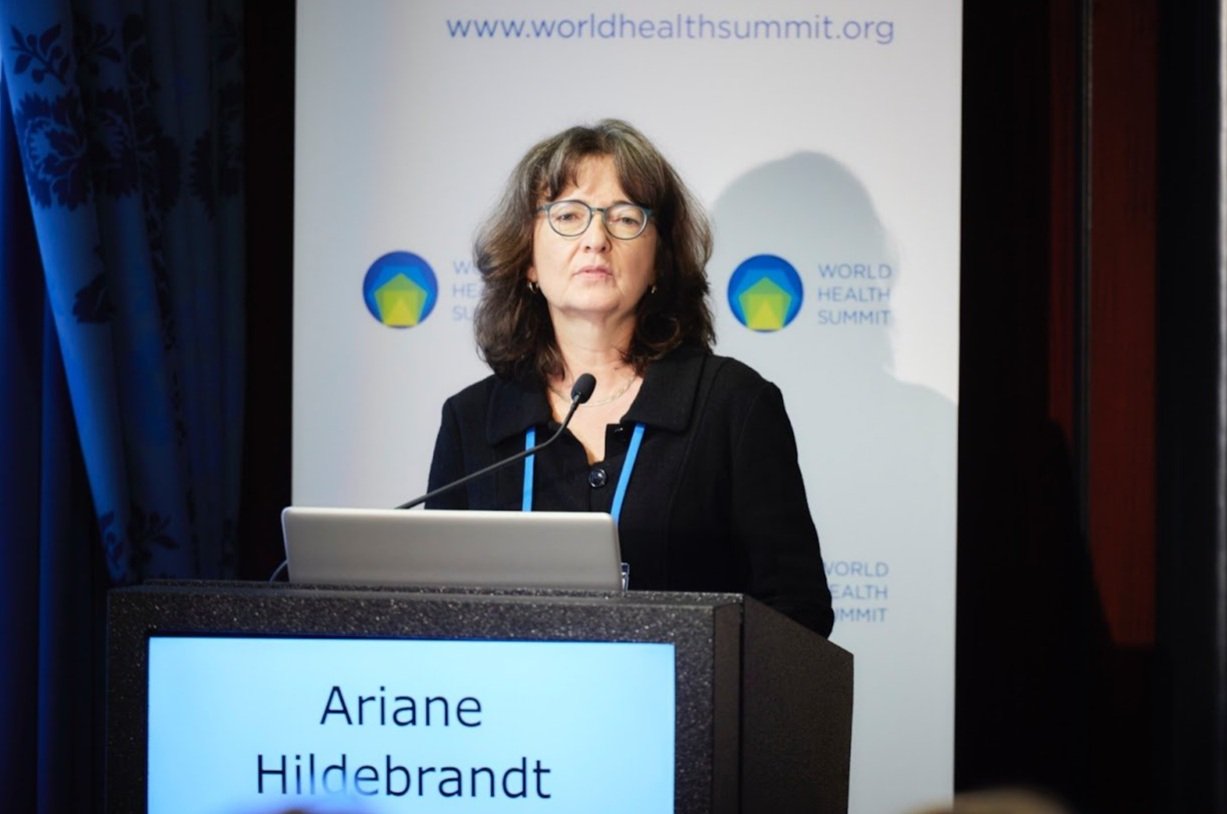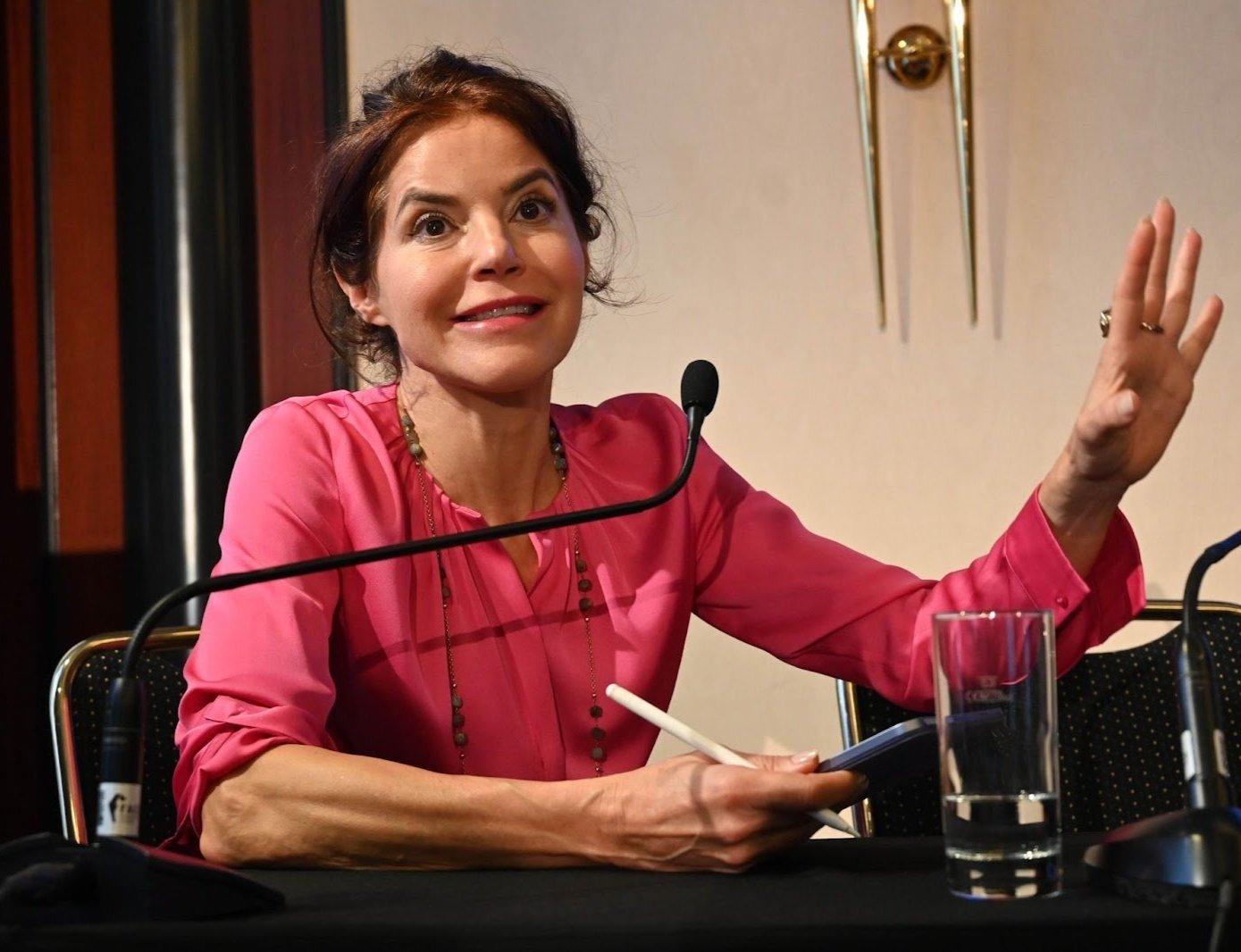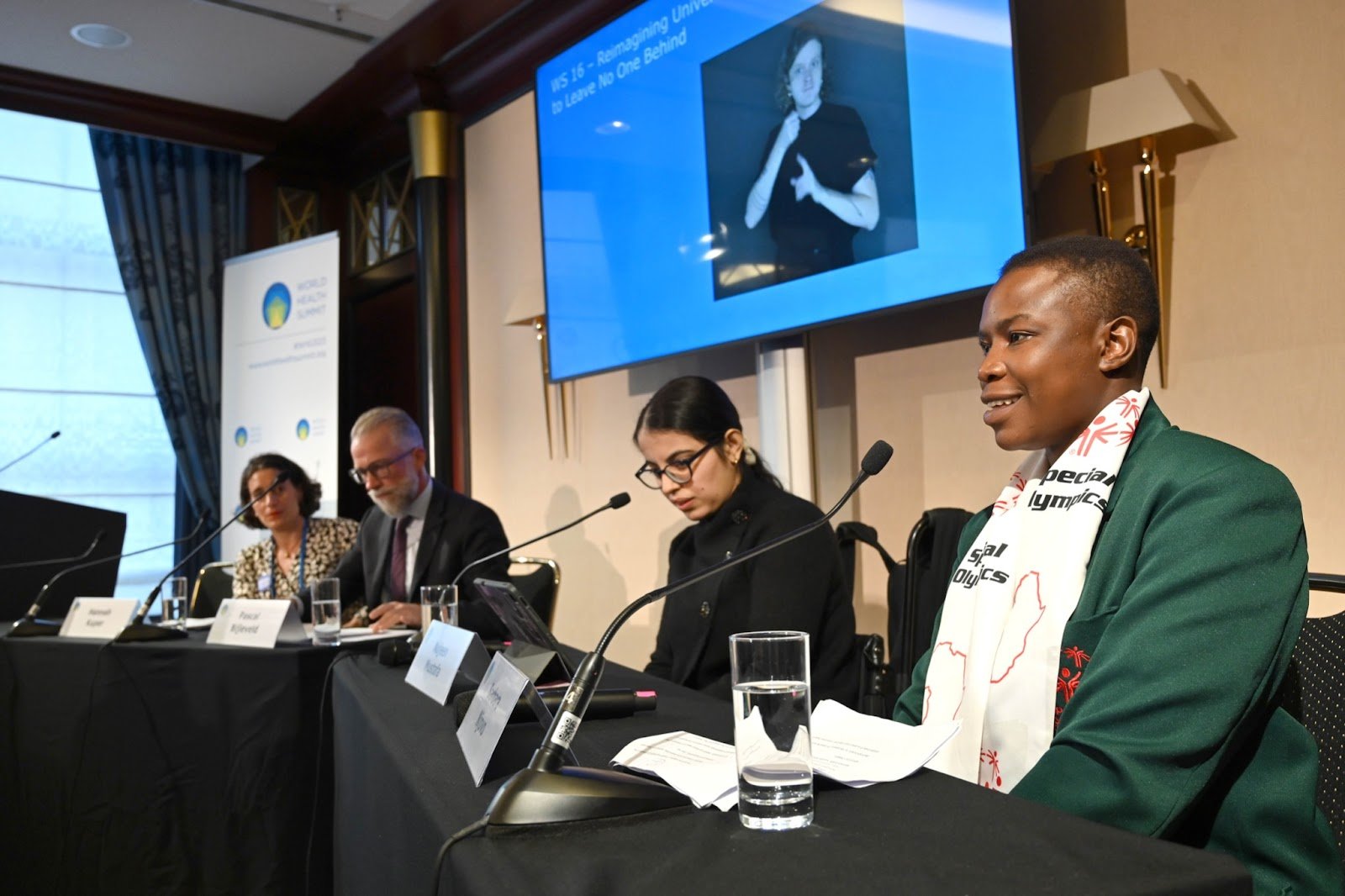Reimagining Universal Health Coverage to Leave No One Behind:
Health Equity for Persons with Disabilities and Access to Assistive Technology as Key Drivers to Achieving UHC
Members of the disability-inclusive health consortium posing after their session with Ilona Kickbusch, Founding Director of WHS. Photo credit : World Health Summit
On October 17th 2023 in Berlin, disability-inclusive health and assistive technology were put on the agenda of the World Health Summit for the very first time. The session “Reimagining Universal Health Coverage to Leave No One Behind: Health Equity for Persons with Disabilities and Access to Assistive Technology as Key Drivers to Achieving UHC” was co-hosted by: ATscale, the Global Partnership for Assistive Technology; Clinton Health Access Initiative (CHAI); CBM Christian Blind Mission; Deutsche Gesellschaft für Internationale Zusammenarbeit (GIZ); Missing Billion Initiative; and Special Olympics with support of the Federal Ministry for Economic Cooperation and Development of Germany (BMZ).
Pascal Bijleveld, CEO of ATscale, and Nujeen Mustafa, Disability and Refugee Rights Advocate & High-profile supporter of the United Nations High Commissioner for Refugees (UNHCR), co-moderated the session. Nujeen kicked off the discussion by sharing some of her own experiences with healthcare growing up in Syria: “For me, accessibility meant having someone strong to carry me down the stairs and take a taxi to the hospital, not having access to assistive technology. This is the reality that people with disabilities live through because health systems do not think about people with disabilities.”
Panelists from left to right: Prof. Hannah Kuper, Pascal Bijleveld, Nujeen Mustafa, Barbara Njovo. Photo credit: World Health Summit.
The dynamic session included experts on disability from the World Health Organization (WHO) and the London School of Hygiene and Tropical Medicine (LSHTM), as well as a Director General from a Ministry of Health, people with disabilities, and health programme leaders who gave overviews of their lived experience with disability and using assistive technology and shared best practices for developing inclusive health services.
The panelists highlighted several key facts:
16% of the world’s population – 1.3. billion people – experience disability in some form, and 2.5 billion people need assistive technology worldwide.
People with disabilities have a life expectancy gap of 10-20 years, largely due to poor health access, status, and outcomes.
The Sustainable Development Goals (SDGs) related to Universal Health Coverage (UHC) will not be met unless there is a focus on improving the health of people with disabilities.
Over 2.5 billion people globally need at least one form of assistive technology, but in LMICs nearly 900 million people do not have access. In low-income countries, only 10% have the assistive technology they need.
Access to assistive technology is a key driver of health inequities and social and economic exclusion, particularly in low- and middle-income countries.
Left to right: Dr. Vanny Peng (GIZ), Prof. Hannah Kuper (Missing Billion Initiative), Dr. Ariane Hildebrandt (BMZ), Pascal Bijleveld (ATscale), Dr. Alarcos Cieza (WHO), Barbara Njovo (Special Olympics). Front row: Nujeen Mustafa, Frederick Msigallah (CCBRT Tanzania)
Photo: Juri Reetz
In addition, the session covered several key questions:
Why does disability inclusion matter in health systems?
Dr. Ariane Hildebrandt, Director-General of the department for global health, equality of opportunity, digital technologies and food security at the Federal Ministry for Economic Cooperation and Development of Germany (BMZ), opened the session by highlighting the urgent need to address disability in UHC and SDG efforts. She announced that BMZ would be monitoring all its global health efforts for disability inclusion and continue to advocate for more disability inclusion in UHC declarations. Germany will further host the next Global Disability Summit together with Jordan in 2025, which shall contribute to more action towards inclusion especially in low and middle income countries.
Dr. Ariane Hildebrandt, BMZ. Photo: World Health Summit
Dr. Alarcos Cieza, Head of the Integrated Service Delivery Unit and the Sensory Functions, Disability and Rehabilitation Unit, WHO Department of Noncommunicable Diseases, highlighted that WHO has also been advocating for more disability inclusion in UN declarations, which has resulted in the recently adopted UHC and pandemic preparedness declarations having specific language which underlines the inclusion of persons with disabilities and older people in health, and access to assistive technology. However, she noted that declarations are not legally binding and more action needs to be taken to address the barriers experienced by people with disabilities in the progress towards UHC.
Dr. Alarcos Cieza, WHO. Photo: Juri Reetz
Professor Hannah Kuper, co-founder of the Missing Billion Initiative and co-director of LSHTM’s International Centre of Evidence in Disability, then reviewed key evidence that shows the importance of disability-inclusive health and access to assistive technology, including the fact that people with disabilities are twice as likely to have HIV, are less likely to afford health care and be vaccinated, and that only 10 percent of the people who need AT in low-income countries have access to it.
Prof. Hannah Kuper, Missing Billion Initiative and LSHTM. Photo: Juri Reetz
How can health be more disability-inclusive?
While the first half of the session highlighted the barriers for people with disabilities and users of assistive technology, and challenges with the lack of disability-inclusive health, the second half emphasized how countries can be more disability-inclusive in their health systems.
Special Olympics Health Messenger Barbara Njovo highlighted how in Zimbabwe, the Ministry of Health has introduced an assisted medical treatment order to ensure that people with disabilities have their health cards stamped to get free and expedited access to health services. She also shared the importance of health worker training and self-advocacy: “Health workers need to have some training about how to serve people with disabilities, especially intellectual disabilities. For example, I went to the clinic and I was automatically given contraceptive pills I did not request. I didn’t have any confidence to go back and ask questions about why I was given the pills.”
Barbara Njovo, Special Olympics Health Messenger, sharing her experience in Zimbabwe. Photo: Juri Reetz
Next, Frederick Msigallah, advocacy officer at the Comprehensive Community Based Rehabilitation Tanzania (CBM partner), spoke about the importance of community-based approaches, such as home rehabilitation, and how they have helped to improve the affordability, accessibility, data collection, and inclusion of people with disabilities in the health system. “Community-based programmes allow for customized support; designed based on local knowledge of the community and tailored to the needs of people with disabilities”.
Panelist Frederick Msigallah, CCBRT Tanzania and CBM partner. Photo: Juri Reetz
Furthermore, Patrick Amoth, Director-General at the Ministry of Health of Kenya, spoke about his country’s commitment to improving the health of people who need rehabilitation and assistive technology especially through a new national strategy on assistive technology, and paying for health insurance for nearly 2,500 improve healthcare services for persons with disabilities and other vulnerable groups to ensure access to healthcare for this population. These approaches, combined with health worker training and further financial inclusion are part of the government's ongoing efforts to achieve UHC and primary health care for people with disabilities.
Patrick Amoth, Ministry of Health of Kenya, pictured on a screen behind the other panelists. Photo: Juri Reetz
Finally, Dr. Vanny Peng, senior health advisor at GIZ Cambodia, described how the IDPoor programme improved the government’s data collection and the overall access to social protection for people with disabilities. With nearly 25% of people with disabilities registered, the programme has helped improve access to free healthcare and transportation for beneficiaries.
Dr. Vanny Peng, GIZ. Photo: Juri Reetz
What are actions to take around inclusive health?
The need for change was evident from the participants as well as those in the room asking questions to the panelists. Each building block of the health system should “Accept, Connect, and Expect” people with disabilities. In particular, governments around the world must:
Include disability in their laws and policies, as well as their leadership structures and health financing initiatives
Collect data on disability to understand and monitor health inequities for people with disabilities
Drive changes for health workforce investment, training and access to rehabilitation and assistive technology
In the spirit of ‘nothing about us, without us’, have partnerships that include people with disabilities and users of assistive technology to be in charge of their health care and advocate for the system-level changes they wish to see.
In case you missed this session, you can watch the recording on YouTube here.
You can find more information on the event on BMZ’s Healthy Developments webpage here.
Disability advocate group attending the World Health Summit
Disability advocates and supporters, left to right, back row: David Duncan, Barbara Njovo, Mary Mwanyika Sando, Miriam Maier, Sara Rotenberg. Front row: Smitha Sadasivan, Frederick Msigallah, Joseph Baraza, Nujeen Mustafa. Photo: World Health Summit
Disability advocates working in health participated in the Summit with the common goal to raise awareness on disability in a sector which often overlooks the needs of people with disabilities. The group of seven self-advocates from around the globe included: David Duncan (Jamaica) and Barbara Njovo (Zimbabwe) from Special Olympics, Joseph Baraza from LCVT Health (Kenya), Fredrick Msigallah from CCBRT Tanzania, Nujeen Mustafa, activist from Syria, Sara Rotenberg from the Missing Billion Initiative (Canada), and Smitha Sadasivan from the UHC2030 Steering Committee (India).
During the three day conference, they challenged speakers on inclusive health in sessions on diverse health topics such as nursing training, health system resilience, mental health, malnutrition, and health innovations, HIV/AIDS or health financing.
During the Panel Discussion on Fostering Health System Resilience in Fragile and Conflict-Affected Countries, hosted by UNOPS, Nujeen asked a question about the inclusion and protection of persons with disabilities in regions of conflict.
Joseph Baraza, Senior Disability Officer at LVCT Health in Kenya, and David Duncan, Special Olympics Health Messenger from Jamaica, highlighted during a discussion on innovations in mental health that when such innovations including Artificial Intelligence are not inclusive for people with intellectual disabilities or deaf people, these will only increase inequalities.
In a panel discussion on equitable access to health innovations, Sara Rotenberg, Missing Billion Fellow, did not hesitate to ask the Executive Director of The Global Fund, Mr. Peter Sands, how he can ensure HIV/AIDS treatment is reaching people with disabilities, as this is currently not the case.
Furthermore, Smitha Sadasivan, Civil Society Representative for the Global South on the UHC2030 Steering Committee, participated in a keynote session celebrating the 75th anniversary of WHO. Alongside German Minister of Health, Smitha emphasized the importance of primary health care and community health workers, as it brings screening of non-communicable diseases, drug supply, palliative care, nursing programmes, and rehabilitation services at people’s doorsteps; and reduces out-of-pocket expenditures of people in need.
At the end of the summit, Joseph also shared his general impressions of the event: “I want to emphasize the importance of including individuals with disabilities on various panels to advocate for our needs, share successes, and discuss challenges experienced and overcome. It's crucial for WHO to make deliberate efforts to implement declarations and resolutions that affect people with disabilities. In terms of accessibility, the venue should be accommodating to those with limited mobility or who use wheelchairs.”
David Duncan while reflecting on his participation expressed “I was also quite pleased that the disability community got the chance to ask questions and voice that there is a gap between meeting the health needs of the general public when compared to the specific health needs of a person with a disability.”











